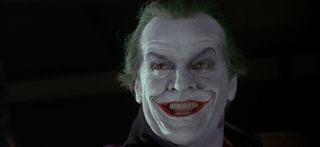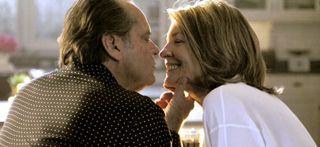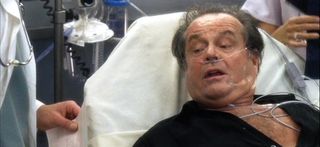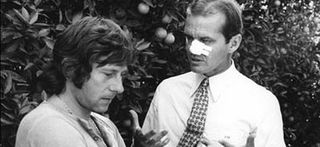Jack Nicholson On Jack Nicholson
Exclusive! Jack chats his career...

Tim Burton's Batman was a very big movie for you. How do you look back on that now?
Around the time of Batman I realised I was fooling around careerwise. It was great work and a great film but I didn't want to be seen as this crazy, Joker figure anymore. I think I had a conversation with myself, a real heart-to-heart, and decided I didn't like people thinking of me as a fool.
I'd done such good work, whether it was Goin' South or One Flew Over The Cuckoo's Nest or Easy Rider ... But I think I was kind of losin' it a little in the quality department. I was doing some movies that I should have backed away from.

Something's Gotta Give followed Anger Management and About Schmidt as your third comedy in a row. How come?
The way I reacted to 9/11 was I decided I didn't want to do any movies that are sad or critical. I decided I didn't want to make my living depressing people or making them go home sick.
So I just decided I wanted to do comedy for a while and study it for a while. It doesn't mean everybody should do that, but that was my reaction.

How did you relate to the character of Harry in Something's Gotta Give? He's a bit like you in many ways...
The same way I react to all of them. I assume most of the characters I play are exactly like me so I don't have to act about that. But you know, comedy is much harder, it's a lot more exacting. You can't just be real and you can't just use the same kind of techniques you use to fill up a regular scene.
So technically I related to it differently. Nancy [ Meyers, Something's Gotta Give's director ] talked to me a lot while writing the script, though. She likes to write for a particular actor so certain amounts of it were actually extracted from those conversations, I imagine.

Did you research what it's like having a heart attack?
I've never had a heart attack, so that was something I had to investigate. Yeah, and then I had to do it from a comedy sense. One thing I learned from As Good As It Gets , where the central part of that story is the man's disease, is that you can't be completely real because the more disease there is, the less funny it is.
The more you graphically, in a kind of Method-acting way, present those realities, the less laughs you get. The main part of this job was to be as vital as the script was, to be as sharp as it was, to get the moments that are there because it's a wonderful script in the great classic tradition.
You know, Preston Sturges, Frank Capra, Mike Nichols, this whole line of American moviemakers. I think it's something that America does very well, those kind of movies.

Previously, you've worked with a lot of great directors who weren't driven by the studios. Do you miss that?
I think there are still people like that. [ Bob Rafelson, Milos Forman, Roman Polanski ] are no more a personal director than Sean Penn or James L. Brooks or Nancy Meyers.
I mean, Nancy is tough with her vision. She has a very clear one, she has total integrity. It's the uniqueness of the movie that makes it personal to me. These people here, to take the three I've mentioned, are unique.
The amazing thing about Jim and Nancy is that they're also understood by a lot of people and that's really the toughest trick in the movie business.
The Total Film team are made up of the finest minds in all of film journalism. They are: Editor Jane Crowther, Deputy Editor Matt Maytum, Reviews Ed Matthew Leyland, News Editor Jordan Farley, and Online Editor Emily Murray. Expect exclusive news, reviews, features, and more from the team behind the smarter movie magazine.
Most Popular
